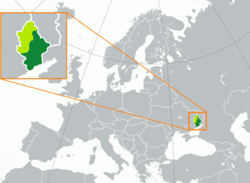March 2020
On March 13, the Minister of Internal Affairs of Ukraine Arsen Avakov stated that there were 12 patients with COVID-19 in Horlivka, a city in DPR-controlled territory. [6]
As a precaution, on 28 March 2020, it was reported that the DPR had closed their borders, with exceptions for citizens of Russia, permanent residents of the DPR and employees of international organizations. Furthermore, mass events were banned. [7]
On 31 March, the first case was announced by a health official of the DPR. The case was a woman who arrived on March 19 from Moscow, Russia, with her husband and young son. [8] [9]
April 2020
On 1 April, the second case was confirmed. The patient is a child of the woman in the first case. The same day, the DPR further restricted its border policies by closing all customs posts with the neighboring LPR. [10]
On 3 April, the third case was confirmed. [11]
Ukraine's Ministry of Reintegration of the Temporarily Occupied Territories claimed that in Luhansk and Donetsk oblasts the real situation regarding the COVID-19 disease was being hidden from its population, and 10,000 people with COVID-19 symptoms were diagnosed with SARS in April. [12] According to the Ministry, the first death from COVID-19 in the territory of Donbas region occurred on 4 April 2020 in Amvrosiivka. They would later rise in their thousands. This was not confirmed by the DPR.
On 7 April, the Donetsk People's Republic administration acknowledged the existence of 6 cases of infection. [13]
On 8 April, another case of the disease was confirmed in a 35-year-old man who had returned from Russia. [14]
On April 10, 5 more cases of infection were confirmed. A total of 13,792 people in the DPR territory were self-isolating. [15]
On 17 April, the number of confirmed infections was elevated to 32. [16]
On 22 April, 36 cases of infection were confirmed in the DPR. [17]
